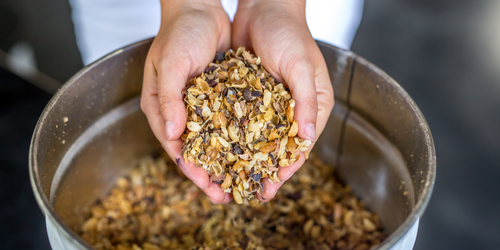Where's our husk from?
24th May 2023
Like every good coffee story, our story begins at origin.
Each year, during the harvest season, coffee producers are faced with tonnes of raw waste in the form of coffee husk. After a coffee cherry is picked, it’s fermented to develop flavour and loosen the fruity flesh surrounding the seed, or bean. Once the desired amount of time has passed it’s then dried and milled. It’s during the milling stage of coffee production that you get husk, the last (second last if you count silver skin) remaining layer before the precious green bean.
We source our husk from Yunnan Coffee Traders (YCT) in rural Southwest China. An emerging origin for specialty grade coffee, they're located in the coffee belt, which, like Panama, Colombia and Ethiopia, are famed regions around the equator, favourable for growing coffee. They export specialty coffee and award-winning micro-lots from the best regional producers, as well as operating a research facility and training centre. In 2019, the Coffee Quality Institute (CQI) launched its new Q Processing program in Yunnan.
Before Huskee, like many coffee farms around the world, husk was used as a fertiliser buffer or a fuel source - albeit not a very efficient one. Leftover husk was then left to pile up, posing not only a fire risk but also a pest problem.
Working with Huskee allows Yunnan Coffee Traders to sustainably dispose of their milled coffee husk, which we collect, transport and repurpose at our manufacturing facility in China. Close proximity to the source is a key factor in reducing transportation and associated environmental impacts.
In addition to supplying husk to Huskee, Yunnan Coffee Traders are actively researching other waste reduction opportunities including husk-based ‘coal’ briquettes, coffee-based organic fertilisers, and coffee-based biochar water treatments. Water treatment is an important consideration at a washing station as you need to ensure local water sources are safe to drink for farming communities and run-off water from coffee production is not adversely affecting local ecosystems.
As we grow as a business and continue to develop our product range, including end of life repurposed HuskeeCups, we are looking to partner with additional coffee farms in other regions.
To learn more about YCT, visit www.yunnancoffeetraders.com or check out their amazing Instagram feed @yunnancoffeetraders


